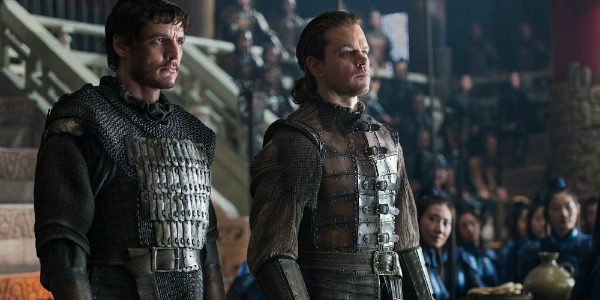The events of The Great Wall take place in ancient China focusing on the character of William. William, and his friend Tovar, are mercenaries traveling the desert of ancient China in search for a weapon that can be considered a treasure. Their travels take them to the great wall of China where they witness a massive attack by a monstrous army of predators. Through this encounter they come to learn that the great wall, and its advanced reinforcements, are the only thing standing between those monsters and the rest of the world.
The skills of William and Tovar come in handy in combat and the military leaders of the wall forces decide to keep them as guests/captives to help protect the wall and also to preserve its secrets. With their eyes set on the secret weapon, the duo decides to wait for the opportune moment to snatch what they can and flee. However, as William gets to learn more about the wall and grow romantic interest in Commander Lin Mei, he becomes torn between his desire to change his life into one that is more honorable on one hand, and his commitment to his friend on the other. Which way will William choose? Will the wall forces succeed in holding the monsters? Those are the questions that the events of The Great Wall answer.
The story doesn’t have a reference in Chinese mythology but is hardly an original concept. The key structure of the story is that of Rudyard Kipling’s “The Man Who Would be King” which was the source of inspiration for various films, the most important of which is the book adaptation with the same name starring Sean Connery and Michael Caine in 1976, while the most recent noteworthy descendant was Avatar in 2009.
The story of the character who walks into a community with evil intentions but then gets affected by the qualities of the other character he’s impersonating and truly changes for the better. A common backbone that goes through a number of phases; first the introduction followed by the infiltration, and then our character changes his mind which usually happens around the same time his cover is blown. This is usually the emotional peak on the dramatic scale, and finally we have multiple variations for the ending depending on the core message of each film.
This time our film presents the idea in an epic spectacle of warfare, action sequences, inventive weaponry and fantasy mixed with Class-A cinematography and utilisation of visual effects. The visual experience of veteran director Zhang Yimou can be described as unique, creative and very smart. Unique because it was smooth and flawless no matter how closely your scrutinize every single piece of details looking for glitches. Excellent monsters design, excellent monster clashes and great 3D work, and this is a big deal coming from me; someone who hates 3D.
The visual experience of The Great Wall was unique, especially in the design of weapons during action sequences, and every time I think to myself that they can’t top what I’ve just seen, a new weapon, that I’m seeing for the first time, comes up. It was also smart because Zhang never resorted to repetition. He has several visual triumphs that he didn’t exhaust even if the events are taking place in their arena. He would show the aftermath or even allow his characters to narrate what we are supposed to learn. The audio experience was also great and Ramin Djawadi’s music was very good.
The dramatic lines on the other hand suffered from the familiarity of the story and the inability to bring anything new to the table. The charismatic presence of Matt Damon played an important role in keeping things interesting when nothing too extravagant was happening on the screen. There was also great chemistry between him and Pedro Pascal, Oberyn Martell from Game of Thrones, who played the character of Tovar. The duo’s contribution to the film was crucial for reasons that are far more important than good performances. As without their star power, we wouldn’t have cared about this movie as much.
That’s not to say that there’s a problem with far eastern movies. Asian cinema gained a lot of merit even in the domain of epic productions with memorable classics like “Crouching Tiger, Hidden Dragon” and “House of Flying Daggers”; another masterpiece by Zhang Yimou. Those however were superior films when compared to “The Great Wall” dramatically.
The biggest dramatic flaw in “The Great Wall” is that all the phases of the story pattern it followed wrapped up long before the movie ended. I followed the final quarter of the movie with great anticipation to see whether the film was actually hiding something new up its sleeves or it will simply let the action proceeds without proper dramatic backing. What took place was unfortunately the latter assumption and what made matters worse is Zhang’s desire not to repeat himself in terms of action sequences, as I pointed earlier. All of that made the ending sequences rather poor with a key scene, without a dramatic influence, being narrated by a character instead of shown on the screen. And while we’re at it, I would also like to add that the defining factor in the battle against the monsters was a bit naive.
That of course is a screenplay problem and I don’t really understand why it would take 3 writers to come up with such a familiar story and then 3 different writers to put together a screenplay with such a clear flaw .. at least from my point of view.
I rate “The Great Wall” at 7/10 in appreciation to the several qualities of the visual experience. Only a few fixes on the storyline would’ve gained the movie a surprisingly higher grade.


